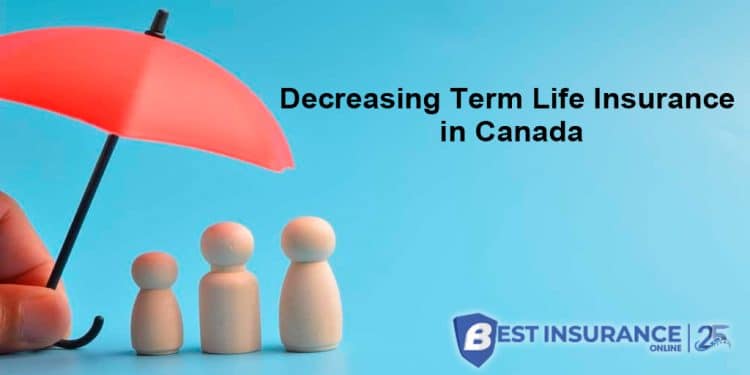Finding the right life insurance to suit your needs can be daunting. With so many options, it’s difficult to know which policy is the best fit. One option that is often overlooked is decreasing term life insurance.
What is Decreasing Term Life Insurance?
Decreasing term life insurance, or mortgage protection insurance, is a one of types term life insurance and temporary life insurance policy in which the death benefit decreases over the policy’s life. However, the premiums remain level.
With decreasing term insurance, you select the length of the term, such as 10, 15, 20, or 30 years. You also choose the starting death benefit amount, which is the amount that would be paid to your beneficiaries if you were to pass away during the term.
The death benefit decreases annually by a predetermined amount or percentage over the policy term, eventually reaching zero.
How Does Decreasing Term Life Insurance Work in Canada?
Here’s an example to illustrate how decreasing term life insurance works:
- John takes out a 20-year $500,000 decreasing term life insurance policy
- In year 1, the death benefit is $500,000
- In year 2, the death benefit decreases to $475,000
- In year 3, the death benefit is $450,000
- This pattern continues every year, with the death benefit declining until year 20 when it reaches zero
- John’s premium payment stays the same each year

So, if John were to pass away in year 1, his beneficiary would receive $500,000. But if he passed in year 10, the payout would be only $250,000.
The Benefits of Decreasing Term Life Insurance
Several advantages make decreasing term life insurance an appealing option:
Lower Premiums
Decreasing-term policies generally have lower premiums than level-term policies with equivalent coverage. The insurer’s risk decreases as the death benefit declines over time, and with less risk comes a lower price tag.
This makes decreasing term life insurance budget-friendly, especially for younger individuals who want protection.
Mortgage Protection
One of the most popular uses of decreasing term life insurance is to cover an amortized debt like a mortgage or personal loan. As you make payments over time, the remaining loan balance owed decreases. The death benefit mirrors this declining balance, ensuring the outstanding debt could be repaid if you pass away prematurely.
Business Loan Protection
For small business owners, decreasing term life insurance can guarantee repayment of a business loan or line of credit in the event of their death. As the loan principal is paid down annually, the matching death benefit also decreases over the policy’s term.
Flexibility
You can customize your decreasing term life insurance policy to fit your unique situation. You can select the coverage amount, length of term and rate of decrease to match your specific needs and obligations.
Disadvantages of Decreasing Term Life Insurance
While decreasing term life insurance can be a cost-effective option, there are some potential drawbacks to consider:
Coverage Gap
The most significant risk with decreasing term life insurance is that it could leave a coverage gap later. If your financial obligations don’t decrease precisely in line with the death benefit, you may be left without sufficient protection later in life.
For example, if you have young children, your need for life insurance may remain relatively high over 20 years. However, a decreasing term policy’s payout would fall dramatically over two decades, leaving you underinsured.
No Cash Value
Decreasing term life insurance policies does not build up any cash value you can access. They are pure insurance, not investment vehicles. If you cancel a decreasing term policy early, you will not get back any money.
Limited Uses
Because the death benefit declines over time, decreasing term insurance works best for short-term needs like mortgages, where the payout required decreases. It is less suitable for income replacement or estate planning, which require lifelong protection.
Conversion Limitations
While many term life policies allow you to convert to permanent life insurance, decreasing term policies often limits how much coverage you can convert. You may be allowed only to convert the original face amount, not the remaining decreased amount.
Ideal Candidates for Decreasing Term Life Insurance
Decreasing term life insurance is best suited to specific individuals:
Mortgage Holders
As outlined earlier, decreasing term life insurance is famous for mortgage holders. It can be customized to match the declining balance of a mortgage. This ensures your family could pay off the outstanding mortgage if you passed away prematurely.
Small Business Owners
For small business owners with a business loan or line of credit, decreasing term life insurance can protect the business against repayment of debts if an owner dies. It’s an affordable way to safeguard the company.
Young Individuals
Younger buyers who need life insurance but are on a limited budget may benefit from decreasing term insurance. The lower premiums provide welcome savings compared to level-term policies.
Parents of Young Children
Some parents plan to stop working full-time after 10 or 15 years to stay home with their children. A decreasing term life policy could provide affordable protection during peak earning years, before retirement.
Individuals with Short-Term Needs
Decreasing term insurance can be cost-effective for those whose need for life insurance is short-term, such as covering student loans. Just be sure to re-evaluate your ongoing insurance needs later in life.
People with Minimal Dependents
A decreasing-term policy may be suitable for someone without a spouse or dependents. A declining payout may be suitable if there will be few ongoing financial obligations after your death.
Who Should Avoid Decreasing Term Life Insurance?
While decreasing term insurance suits some people well, it may be inappropriate for others:
Families with Young Children
If you have young kids, your need for life insurance will likely stay vital for a while. Stick with level-term insurance to avoid being underinsured later on.
High-Income Earners
Individuals with incomes likely to rise significantly may require a lifelong, high-death benefit. In that case, decreasing term insurance is not the best fit.
People with Long-Term Goals
Decreasing term insurance won’t work if you need coverage for lifelong goals like funding your children’s university education. The payout would be too low later on.
Those with Minimal Mortgage Debt
Some people pay off their mortgages quickly or downsize later in life. For them, a decreasing term policy could exceed their remaining mortgage balance, resulting in overinsurance.
People with Chronic Health Conditions
If you develop a serious health condition during the term, you may struggle to qualify for new life insurance after your decreasing term policy expires. Permanent insurance may be better.
Business Partners Relying on Payout
If business partners depend on a large capital payout to buy their share, a decreasing term policy’s diminishing payout may leave them short.
Decreasing Term vs. Level Term Life Insurance
Decreasing term life insurance differs from traditional level term insurance in a couple of crucial ways:
Death Benefit
The main difference is the death benefit amount. With level term life insurance, the death benefit remains constant over the entire policy term.
Decreasing term insurance sees the death benefit decline incrementally throughout the term until it reaches zero.
Cost
Due to the decreasing death benefit, decreasing term life insurance premiums are generally 10-40% lower than level term premiums.
However, the term’s level term premiums are fixed, whereas decreasing term premiums remain unchanged even as the payout decreases.
Usage
Decreasing term insurance is best suited for temporary needs like mortgages or loans. Level-term insurance provides lifelong protection suitable for income replacement and financial security.
Flexibility
Level-term policies offer more flexibility to renew coverage or convert to permanent life insurance. Decreasing term policies may impose limits on renewability and conversions.
Gaps in Coverage
Decreasing term insurance can leave you underinsured if your needs don’t decline on the same schedule as the death benefit. With level term insurance, your coverage remains constant.
What Decreasing Term Life Insurance Costs in Canada
Decreasing term life insurance costs less than level term insurance with comparable coverage. Exactly how much you can expect to pay depends on multiple factors:
Age
The younger you are when you purchase life insurance, the lower your premiums since the insurer faces a lower mortality risk. However, premiums rise steadily as you age.
Health
Your medical history has a significant impact on life insurance rates. Healthy applicants enjoy lower premiums. Those with pre-existing conditions or chronic illnesses can expect to pay more.
Lifestyle
Insurers will ask about lifestyle factors like smoking, alcohol use and hobbies. Risky activities like skydiving or smoking will boost your premiums.
Gender
Statistically, women tend to live longer than men. This allows insurers to offer women lower life insurance rates.
Death Benefit Amount
Naturally, the higher the death benefit you choose, the more your decreasing term life insurance will cost. A lower payout means lower premiums.
Length of Term
Like auto or home insurance, the longer the policy term, the more expensive coverage becomes due to added risk over time.
Here are some sample monthly premiums for a healthy 30-year-old:
| Coverage Amount | 10 Year Term | 20 Year Term | 30 Year Term |
|---|---|---|---|
| $250,000 | $16 | $21 | $30 |
| $500,000 | $27 | $37 | $53 |
| $1,000,000 | $50 | $69 | $100 |
How to Choose the Best Decreasing Term Life Insurance
If you decide decreasing term life insurance makes sense for your situation, here are some tips for choosing the right policy:
- Shop Around – Get quotes from several highly-rated insurance companies. Comparing rates is the only way to ensure you get the lowest premiums.
- Customize the Term – Pick a term length that closely aligns with the duration of your need. Avoid significant gaps in coverage.
- Match Your Debt – Tailor the death benefit and rate of decrease to mirror any loans like a mortgage you want to cover.
- Lock In Insurability – Apply while young and healthy to secure the lowest premiums. Your health may decline later on.
- Review Conversion Options – Understand any limitations around converting to permanent insurance.
- Consider Riders – Riders like critical illness insurance can enhance your decreasing term life insurance.
- Examine Financial Strength – Be sure to buy from an insurer with an established history and strong financial standing.
Alternatives to Decreasing Term Life Insurance
If decreasing term insurance isn’t the right solution, here are some other options to consider:
Level Term Life Insurance
This provides a death benefit that remains level for the entire policy term. It’s better suited for lifelong income protection and financial security.
Whole Life Insurance
Whole life insurance in Canada remains in force for your entire life as long as you pay premiums. It builds cash value and can be used for estate planning.
Universal Life Insurance
With universal life insurance, you can adjust your death benefit and pay flexible premiums based on changing needs.
Mortgage Life Insurance
Some lenders sell mortgage life insurance to repay the mortgage if you die. Be sure to shop around for better rates.
Critical Illness Insurance
This provides a lump sum living benefit if you’re diagnosed with a covered critical disease like cancer or stroke.
Decreasing Term Life Insurance Companies in Canada
When looking for decreasing-term life insurance in Canada, you have plenty of highly reputable life insurance companies in Canada to choose from. Here is an overview of some of the top options:
Canada Life
- One of Canada’s largest and oldest insurers, founded in 1847
- Offers 10, 15, 20, 25 and 30-year renewable and convertible decreasing term life insurance
- Allows you to apply entirely online in just minutes
- Policies can be customized to match your mortgage
- Strong financial strength rating of A+ from S&P
Read full review: Canada Life Insurance
Sun Life
- Another highly regarded Canadian insurer, in business since 1865
- Provides 10, 15, 20, 25 and 30-year decreasing term life insurance
- It lets you apply online or work with an advisor
- The policy can be set up to cover the mortgage balance
- Solid financial ratings, including S&P AA
Read full review: Sun Life
iA Financial Group
- Initially founded in 1892, with over 4 million customers
- Decreasing term life insurance terms of 10, 15, 20 or 25 years
- Offers optional critical illness and disability income riders
- Can convert to permanent insurance later on
- Rated A+ Superior by A.M. Best
Read full review: iA Financial Group
RBC Life Insurance
- Part of Canada’s largest bank, in business since 1864
- Provides both renewable and convertible decreasing term life insurance
- Can add optional child protection and accidental death riders
- Apply online, and policies are issued quickly
- Given high ratings from all major agencies
Read full review: RBC Insurance
Equitable Life of Canada
- One of Canada’s mutual life insurance companies, operating since 1920
- Decreasing term insurance available in 10, 15, 20 and 25 year terms
- Policies can cover mortgages, loans, tuition fees and more
- Can convert to permanent insurance without medical testing
- Rated A (Excellent) by A.M. Best
When searching for decreasing term life insurance, partnering with one of these established leaders can provide peace of mind. Be sure to compare rates between companies to find the best value.
Read more: Equitable Life of Canada
Is Decreasing Term Life Insurance Right for You?
Here are a few quick questions to help assess if decreasing term insurance may make sense for your situation:
- Do you have a mortgage or loan you want to cover that steadily decreases?
- Are your insurance needs short-term for the next 10-20 years?
- Will your financial obligations decline over time?
- Do you have minimal dependents relying solely on your income?
- Does the lower cost of decreasing term insurance appeal to your budget?
If you answered yes to most of these questions, decreasing term life insurance could be a beneficial choice for you. It offers substantial initial coverage that gradually decreases as you pay off temporary debts, aligning with your financial situation.
However, if you have young kids or need lifelong insurance, traditional level term policies are likely the better fit. They deliver stable, lifelong protection.
Getting the Decreasing Term Right Life Insurance for You
Choosing the right Decreasing Term life insurance is critical to protecting your loved ones and legacy. However, with so many options, it can take time to identify what type and how much coverage to get.
Instead of navigating the complex world of life insurance on your own, consider partnering with an independent life insurance brokerage. Their experienced advisors will thoroughly assess your financial situation and provide personalized policy recommendations that best suit your needs.
They can then make personalized policy recommendations that best suit your needs—level term, decreasing term, or permanent life insurance. Their guidance is free; they can access quotes from dozens of highly rated insurance carriers.
Don’t leave this important decision to chance. Get the life insurance advice and service you deserve by contacting an independent brokerage today.
What happens when my decreasing term life insurance policy expires?
When a decreasing term life insurance policy ends, the coverage expires. Unlike some term policies, the decreasing term does not include a conversion or renewal option. You'll need to apply for new coverage.
Can I convert my decreasing term life policy to permanent insurance?
Some, but not all, decreasing term life insurance policies allow you to convert to permanent insurance like whole life or universal life before the term expires. However, the amount you can convert may be limited to the original face amount, not the current decreased amount.
Is decreasing term life insurance a good idea if I have young kids?
Some, but not all, decreasing term life insurance policies allow you to convert to permanent insurance like whole life or universal life before the term expires. However, the amount you can convert may be limited to the original face amount, not the current decreased amount.
Is decreasing term life insurance a good idea if I have young kids?
Long-term life insurance is a better choice for most people with dependent children. Your need for coverage is unlikely to decline much in the next 10-20 years while kids rely on your income, and decreasing term could leave you underinsured.
What changes can I make to my decreasing term life policy?
Depending on the insurer, you may be able to increase/decrease the death benefit, add riders like critical illness, or extend the length of the term. Most adjustments will increase premiums. There may also be small policy amendment fees.
Are payouts from decreasing term life policies considered taxable income?
No, life insurance proceeds paid to your named beneficiaries are entirely tax-free. Your beneficiaries get to keep the full death benefit amount, and the funds do not count as taxable income.
Should I tell my insurer if I make changes to my mortgage?
It's essential to inform your decreasing term life insurer if you refinance, take money out, or make other significant mortgage changes. Your existing policy may no longer align well, and the insurer can adjust the death benefit.
How do I determine the proper payout amount for decreasing term insurance?
Consider the size of debts and financial obligations you want to cover, like a mortgage balance. The death benefit should align closely with the outstanding amount to avoid over or underinsuring.
Is decreasing term life insurance renewable?
Unlike some term life policies, decreasing term insurance does not include a renewal option at the end of the term. The policy and coverage expire at the end of the predetermined term length.
What types of debts can decreasing term life insurance cover?
Typical uses cover mortgage balances, personal loans, student loans, and small business loans. The death benefit can be matched to the outstanding balance of these steadily declining debts.
Who should consider decreasing term life insurance?
It can make sense for young, healthy people with high temporary insurance needs, homeowners with mortgages, small business owners with loans, and those whose financial obligations will decline.













